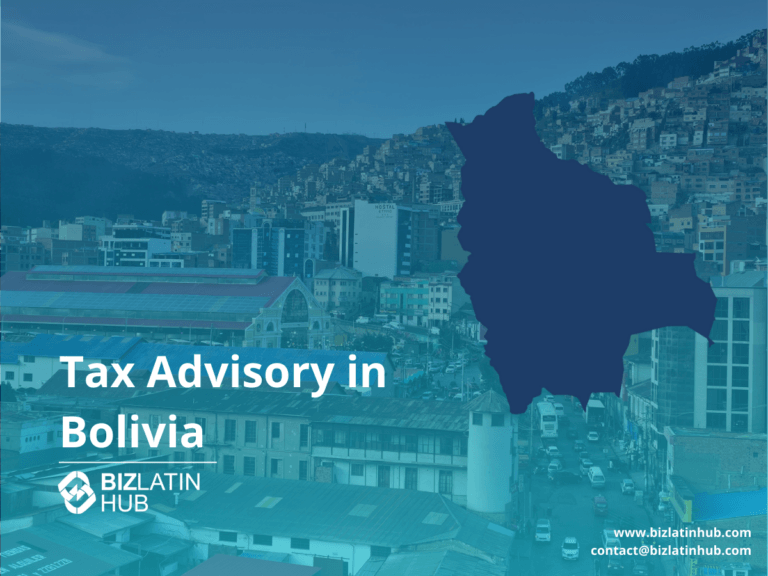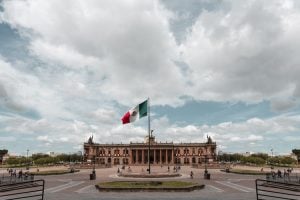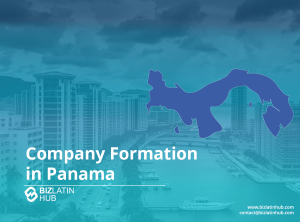Understanding the complexities of legal entities in Bolivia is essential for choosing the right corporate structure when looking to register a company in Bolivia. Understanding and adhering to all legal and accounting requirements specific to the legal entities in Bolivia is paramount for smooth operations and compliance. Collaborating with local experts allows you to navigate the regulatory framework with confidence and clarity. Whether opting for flexibility or liability protection, at Biz Latin Hub, we provide the knowledge and support you need to ensure seamless integration into Bolivia’s entrepreneurial ecosystem.
Key Takeaways
| Common legal entity types in Bolivia | LLC in Bolivia (Sociedad de Responsabilidad Limitada – S.R.L.). Joint Stock Company (Sociedad Anónima, or S.A.). Unipersonal (Empresa Unipersonal). Branch Office. |
| What is the most common Bolivian business entity? | The Sociedad de Responsabilidad Limitada (S.R.L.), creates what is essentially and LLC in Boliva, offering similar benefits to investors. |
| What are the primary considerations when choosing a business entity in Bolivia? | Ownership Structure. Tax Efficiency. Profit distribution. Transfer Pricing. Compliance. Flexibility. |
3 Common types of legal entities in Bolivia
The three most common legal entities in Bolivia are:
- LLC in Bolivia (Sociedad de Responsabilidad Limitada – S.R.L.)
- Joint Stock Company (Sociedad Anónima, or S.A.)
- Unipersonal (Empresa Unipersonal)
- Branch Office
Below is each structure in more deatil:
1. Limited Liability Company or ‘Sociedad de Responsabilidad Limitada’ (S.R.L.)
In Bolivia, the Limited Liability Company (LLC) is known as a Sociedad de Responsabilidad Limitada (S.R.L.). This structure provides limited liability protection to the shareholders, meaning their assets are generally protected from business debts and liabilities.
S.R.L.´s are closed partnerships in which the identity of the quota holders is key. Capital is divided into installments of equal value, which will be one hundred or multiples of one hundred Bolivianos. This must be paid in full, in the act of social constitution, whether the contribution is in money or kind. In the case of the latter, it must be officially valued.
The company name must be chosen according to the type of business activities or can be formed with the shareholder’s name adding S.R.L. or Ltda.
- Shareholders- The shareholders of an S.R.L. can be individuals or legal entities (foreign or national) The minimum shareholders required by law is two (Maximum 25)
- Management: The management structure is typically outlined in the company’s articles of incorporation. Shareholders must appoint a legal representative who must be Bolivian or a foreign person with legal residency in Bolivia.
- Capital Contributions: Members contribute capital to the company, and their ownership stake is generally proportionate to their contributions. The S.R.L. structure allows for flexibility in terms of capital contributions.
- Transfer of shares: A shareholder’s meeting must be held to approve the admission of new shareholders. The approval must garner a 2/3 majority of the social capital to be considered valid. Subsequently, this document must undergo notarization and be registered with the Registry of Commerce office.
- Fiscal Address: The company must register a Fiscal Address before the Tax Authority
2. Public Corporation or ‘Sociedad Anónima’ (SA)
A joint stock company in Bolivia is known as Sociedad Anónima, or S.A. This type of company is popular for large companies. The main characteristics of an S.A. legal entity in Bolivia include:
- The share capital is divided into shares.
- The shareholders have limited liability up to the amount of their contributions, i.e. their assets are protected from company liability.
- An S.A. can be constituted by the sole act of the founders or by public subscription of shares.
- Shares can be freely transferred, subject to any restrictions in the company’s bylaws.
- Minimum Capital Requirements: There may be minimum capital requirements for the establishment of a Sociedad Anónima, and this capital is divided into shares.
- Board of Directors: The company is typically managed by a board of directors, elected by the shareholders. The board makes major decisions on behalf of the company.
- Sociedades Anónimas are usually required to file annual reports with the commercial registry, the Tax Authority and other relevant authorities.
- Bylaws: The company operates according to a set of bylaws that outline its internal rules, including procedures for shareholder meetings, distribution of profits, and other important matters.
- Audit Requirements: Depending on the size and nature of the business, there may be requirements for regular audits of the company’s financial statements.
3. Unipersonal Company or ‘Empresa Unipersonal’
A Unipersonal Company is a company made up of a natural person who carries out trade as a regular economic activity. This person may be a citizen or foreign national. To form this entity, they must present their Identity Card or the original documentation that proves their legal residence in Bolivia. Depending on the intended capital amount for the entity, owners may need to present an opening balance signed by the Owner or the Legal Manager and a Registered Accountant or Auditor.
If a Legal Representative is appointed, an original Power of Attorney or a certified copy must be attached to the registration documents. The Bolivian Commercial Registry will then register the entity, and owners can begin operations as a legally constituted company.
Note: The unipersonal Company does not have its own legal personality, unlike commercial companies. The owner of one of these companies is liable for company obligations with their personal assets.
Another option: Establishing a branch in Bolivia
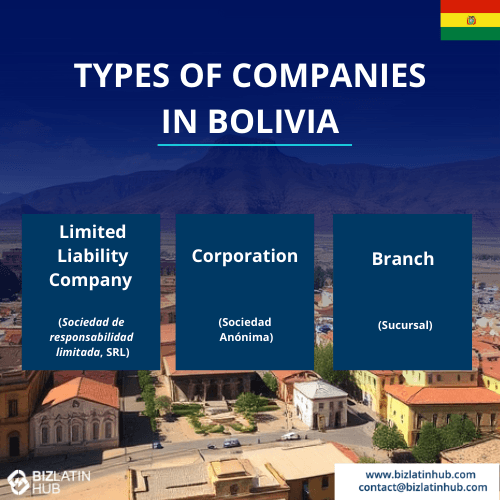
Foreign companies have the option to establish a branch as a representative office in Bolivia. The primary advantage of a branch lies in its ability to uphold the brand and reputation of the parent company. This allows the branch to leverage the existing resources and expertise of the parent company, particularly in the context of public auctions and engagement in governmental projects.
The establishment procedures for a branch in Bolivia may extend in duration, primarily due to the requirement for document apostillation at the company’s headquarters. The parent company is obligated to furnish authenticated and apostilled hard copies of the articles of incorporation, bylaws, and amendments if any, and the good standing certificate.
The main characteristics of a foreign branch in Bolivia are:
- The branch will adopt the identical name as the parent company, with the addition of ‘Sucursal Bolivia.’
- Is a separate legal entity from the parent company through financial dependence and is required to deposit a minimum authorized capital into a Bolivian bank account
- The branch will operate following Bolivian laws and regulations; while management decisions typically align with guidelines from the parent company, they can be adapted to suit the Bolivian context.
- A legal representative, who legally resides in Bolivia, must be appointed, acting through a power of attorney on behalf of the branch before local authorities.
- Formal registration with the Bolivian National Registry of Commerce (SEPREC) is a mandatory step.
- Has its own financial records and tax obligations in Bolivia.
- Subject to Bolivian taxes, including income tax, value-added tax (VAT), and social security contributions.
Note: The liabilities assumed by a branch extend to its parent company without restriction.
Key Considerations When Choosing Legal Entities in Bolivia
Ownership Structure
Evaluate whether your chosen business entity permits full foreign ownership. In Bolivia, foreign investors are generally allowed 100% ownership across most industries. However, strategic sectors such as hydrocarbons, mining, and telecommunications may involve government oversight or partnerships with the state due to Bolivia’s nationalization policies. Understanding these sector-specific regulations is essential for compliance and long-term operational stability.
Tax Efficiency
Analyze the impact of Bolivia’s tax system on your business. The corporate income tax (Impuesto sobre las Utilidades de las Empresas, or IUE) is set at 25%, with an additional 12.5% surtax applied to profits derived from foreign beneficiaries. Additionally, there is a 13% VAT on goods and services. Companies in export-oriented sectors or specific industries such as manufacturing or renewable energy may benefit from special tax incentives. Proper tax planning and exploring any available exemptions can help optimize costs while adhering to local regulations.
Profit Distribution
Consider the tax implications of distributing profits in Bolivia. Dividends paid to non-residents are subject to a 12.5% withholding tax on top of corporate taxes. Bolivia does not have an extensive network of double taxation treaties, so careful planning is needed to structure profit repatriation effectively. Developing a clear strategy for distributing earnings while minimizing tax liabilities will be critical for maximizing shareholder returns.
Transfer Pricing
Comply with Bolivia’s transfer pricing regulations, which require cross-border transactions between related parties to reflect arm’s-length pricing. Businesses involved in import/export activities, intellectual property transfers, or intercompany loans must prepare transfer pricing documentation to justify pricing and demonstrate compliance. Failure to comply can result in penalties or audits, so accurate annual reporting is essential.
Compliance
Prepare for Bolivia’s compliance and regulatory obligations. Businesses must register with the National Tax Service (SIN) and the Commercial Registry (Fundempresa). Financial reporting must align with Bolivian accounting standards, which are based on IFRS. Annual income tax declarations and monthly filings for VAT and payroll taxes are mandatory. Social security contributions to the Bolivian social security system (Caja Nacional de Salud) are required for all employees. Adhering to these obligations is critical to maintain legal standing and avoid penalties.
Flexibility
Choose a business structure that aligns with your operational and strategic needs. The most common business structures in Bolivia include:
- Sociedad de Responsabilidad Limitada (SRL): Suitable for small to medium-sized businesses with up to 25 partners. It provides limited liability and a simpler governance model.
- Sociedad Anónima (S.A.): Ideal for larger companies or those seeking to raise capital through share issuance. It requires a minimum of three shareholders and allows greater flexibility in ownership transfer.
- Empresa Unipersonal: A structure for sole proprietors, offering simplicity but lacking limited liability protection.
Choosing a flexible structure ensures your business can adapt to changes in Bolivia’s dynamic regulatory and economic environment.
Our recommendation: The SRL, as it offers limited liability protection to shareholders, flexibility in shareholding structure, management and capital contributions. In addition, it offers relatively simpler procedures for the transfer of shares compared to an SA, which makes it a suitable option for foreign companies in Bolivia.
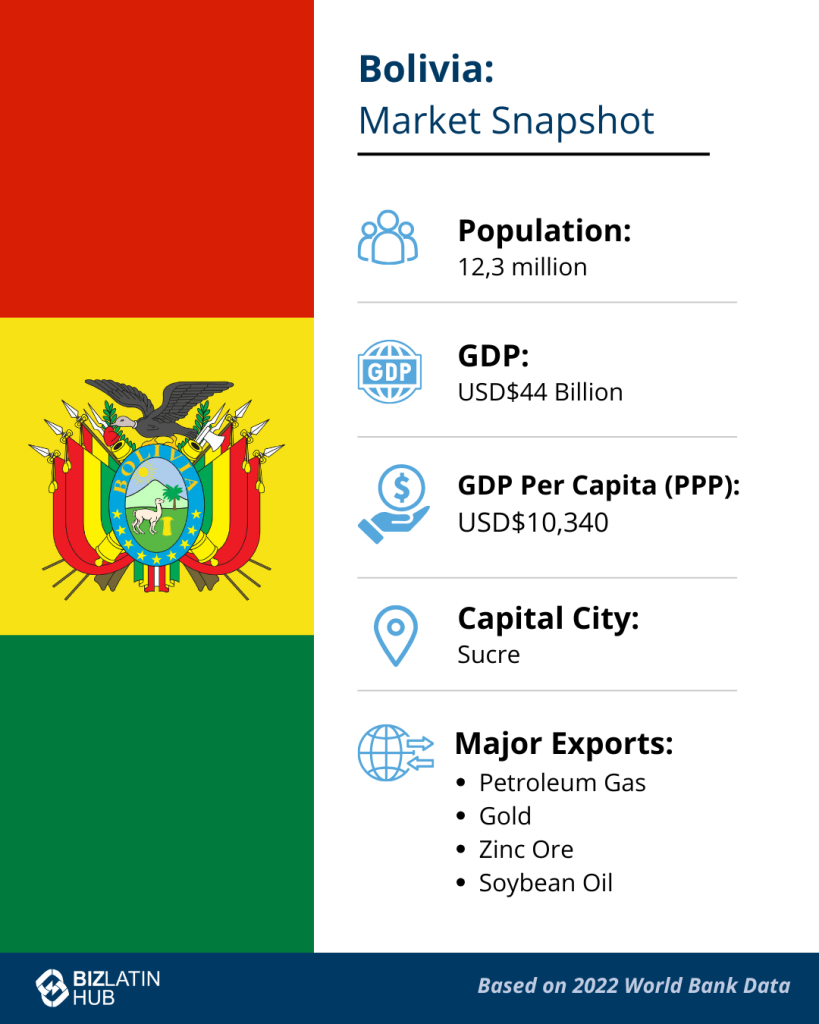
FAQs on types of legal entities in Bolivia
1. Can a foreigner register a company in Bolivia?
Yes, foreigners can register a company in Bolivia. The Bolivian government encourages foreign investment and provides avenues for foreigners to establish businesses within the country.
2. What is an LLC in Bolivia?
An LLC, or Limited Liability Company, is a type of legal entity in Bolivia that combines the limited liability protection of a corporation with the flexible management structure of a partnership. It offers protection to its members’ personal assets while allowing for pass-through taxation.
3. How to Incorporate a Legal Entity in Bolivia?
- Choose a Legal Structure
- Reserve a Company Name
- Draft Articles of Incorporation
- Notarized Documents
- Register with the Trade Registry
- Tax Registration
4. How do I create an LLC in Bolivia?
To create an LLC (Limited Liability Company) in Bolivia, you must follow the registration process outlined by the Bolivian government.
5. What are the main differences between an S.A. and an S.R.L. in Bolivia?
| SRL | SA | |
| Shareholders | Minimum (2) maximum (25) | Minimum (3) unlimited |
| Shareholders Meeting | Named as Asamblea de Socios, is the highest authority and makes decisions | Named the Junta de Accionistas, is the highest authority and makes decisions |
| Capital | Subscribed | Divided into shares |
| Legal Representation | (1) Legal representative is mandatory (adding more is optional) | Board of Directors (minimum 3 maximum 12) |
| Duration | Up to 99 years (renewable) | Up to 99 years (renewable) |
| Transfer of shares | A shareholders meeting is required | Free transfer of shares |
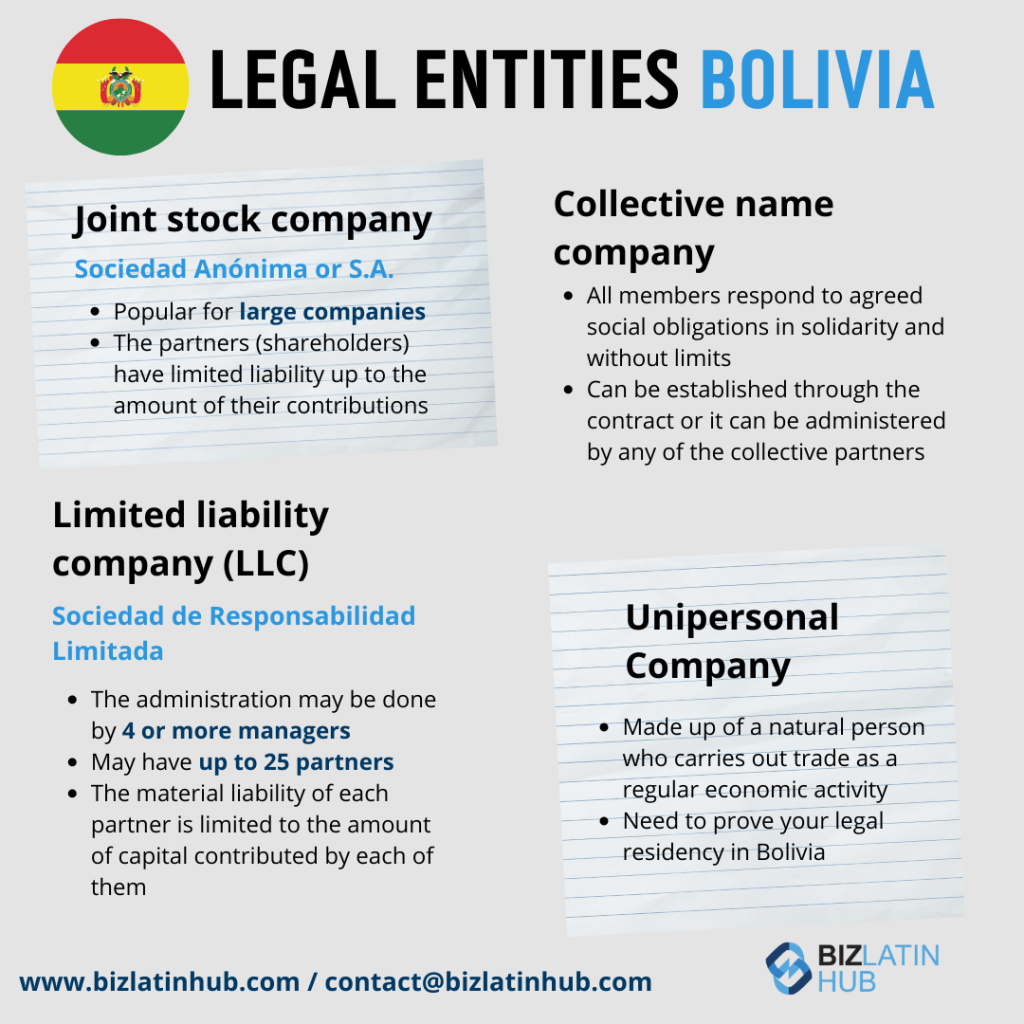
Why Choose to Invest in Bolivia?
Bolivia offers a rich investment environment supported by vast natural resources and an emerging economy. Its political framework emphasizes national sovereignty and economic development, creating opportunities for foreign investors. Regional trade agreements with partners in Latin America and strategic partnerships with global powers bolster Bolivia’s connectivity in international markets.
As a global leader in lithium reserves, Bolivia holds critical mineral resources, including silver, tin, and natural gas, essential for modern industries. The country’s diverse geography, from high-altitude plateaus to tropical lowlands, provides significant potential for renewable energy projects such as solar, wind, and hydropower. Developing infrastructure in transport, energy, and telecommunications supports growing business operations across sectors.
Bolivia’s government offers targeted investment incentives in sectors like energy, mining, and agriculture, promoting foreign participation in strategic industries. Located at the heart of South America, Bolivia serves as a bridge connecting regional markets. Its young, growing workforce presents opportunities for companies looking to expand in an increasingly dynamic economic landscape.
Do you need more information about the types of legal entities in Bolivia?
There are different and varied types of legal entities in Bolivia, each with distinctive characteristics. Business owners should think carefully about which entity is best suited for their business needs before incorporating in the country. To understand which legal entity in Bolivia is the best fit for your company, seek advice from trusted local experts.
Biz Latin Hub is here to advise you in this process. Our specialists provide trusted, comprehensive accountancy, professional employment, legal services, and specialized company incorporation. We have a team with the necessary knowledge and experience to help you in this process. Contact us now to learn more.
Learn more about our team and expert authors.

